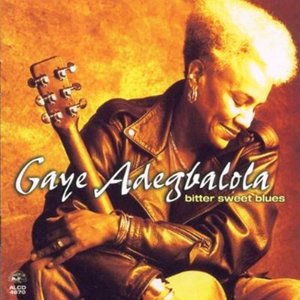Published on Nov 27, 2001
If women had balls, Gaye Adegbalola would have a set that could
rival many men.
Somehow, I think that Adegbalola, one of the founding members of
Saffire The Uppity Blues Women, would take that as a compliment
when referencing her 1999 solo debut
Bitter Sweet Blues. Who else could tackle such issues as
racism, spousal abuse, sexuality of all kinds and religion in such
a cohesive package?
While the blues has always seemed like it was a form of music
that welcomed men and women, Adegbalola seems like she’s constantly
kicking at the door in front of her in order to have her message
heard. Maybe that’s why it’s a little uncomfortable to hear a song
like “Big Ovaries, Baby” while the listener might not think twice
if a man made a similar bragging comment about his machismo. Once
you get over the initial shock, though, Adegbalola does deliver a
pretty powerful message in the song – namely, that she’s just as
bold as any man out there.
Not all the songs on
Bitter Sweet Blues are quite as bold. Tracks like “She Just
Wants To Dance” don’t seem to have any hidden agenda, and are meant
to be taken at face value as catchy numbers that might get you up
and moving. Others, like “Jail House Blues,” reach back to the days
of Leadbelly and Blind Lemon Jefferson, albeit with a starker sound
devoid of unneeded instrumentation, and paint the kind of dark
picture that well-done blues can create. Still others, like “The
Dog Was Here First,” offer light-hearted moments at just the right
time.
Yet
Bitter Sweet Blues is an album that challenges the
listener’s line of thinking on many levels. If you think that this
disc is just going to allow you to sit back and enjoy the music,
think again. Adegbalola wants you to use your brain, and dares to
get it working regarding subjects like incest (“Nightmare”), abuse
(“You Don’t Have To Take It (Like I Did)”), racism (“Nothing’s
Changed” – complete with some spicy slide guitar work) and
declaration of one’s sexuality (“Front Door Blues”). Yet for all
these challenges, Adegbalola never loses sight of the music, which
is the first thing the listener is hit with. By her keeping focus
on both sides of the coin, the songs – and, in turn, the whole
album – succeed in their missions.
Yet
Bitter Sweet Blues is not the kind of album you grab at a
light-hearted moment – and that is the only real negative I can see
with the disc. Granted, you don’t have to be ready to stick your
head in the oven to listen to this disc, but you admittedly have to
be in the right mindframe to fully appreciate what Adegbalola is
trying to accomplish here. For a mood piece, it’s a wonderful
selection.
I admit I’ve never been a big fan of Saffire, which could
explain why
Bitter Sweet Blues has sat in the Pierce Memorial Archives
waiting to be discovered. Thankfully, Adegbalola has given us
another reason to appreciate the blues as a true American classic,
and
Bitter Sweet Blues is an album that is well worth checking
out – provided you’re willing to invest the effort that the disc
all but demands.
